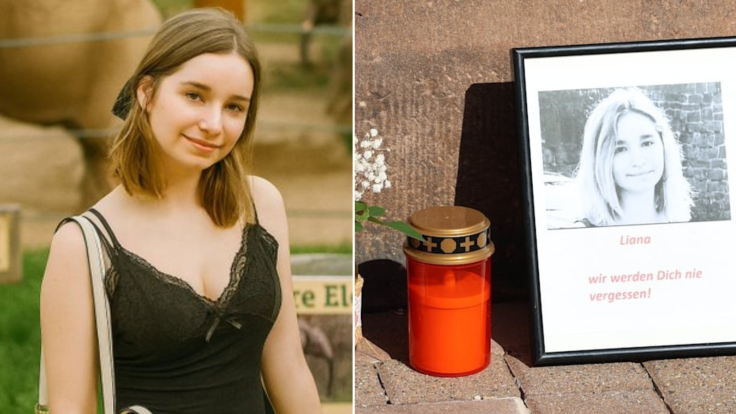Ukrainian Girl 'Pushed Under Train' in Germany as Authorities Face Backlash for Calling It Suicide
German investigators face criticism after the death of a 16-year-old Ukrainian refugee was initially described as suicide, despite evidence suggesting she was pushed onto the tracks.

A promising 16-year-old Ukrainian refugee was killed in Germany after being struck by a speeding freight train — but what police first called a suicide now appears to be a possible homicide, with investigators uncovering DNA evidence linking a rejected Iraqi asylum seeker to the teenager's final moments.
A Tragic End in Friedland
On 11 August in the German city of Friedland, 16-year-old Ukrainian refugee Liana K. was killed after being struck by a freight train travelling at around 100 kilometres per hour. She had been on her way home from her dental assistant apprenticeship and was speaking on the phone with her grandfather when he suddenly heard her scream, followed by the sound of the train.
At first, authorities labelled her death a suicide, a conclusion her grieving family immediately rejected. Her loved ones described her as ambitious and devoted to her studies and siblings, insisting she had no reason to end her life.
Evidence Points to Foul Play
German media later revealed that investigators had identified a suspect: a 31-year-old Iraqi citizen whose asylum request had been rejected months earlier.
DNA traces of the man were discovered on Liana's shoulder, consistent with a violent shove onto the tracks. Witnesses also reported that she had been harassed by migrants shortly before her death.
Despite this evidence, the suspect was not detained on the day of the incident. Instead, police initially accepted his account that he had merely discovered the girl's body on the tracks. Only later, when forensic results came back, was he placed under arrest and transferred to psychiatric care.
The Suspect's Background
The suspect, identified in German media as Muhammed, had a troubled history. Prosecutors said he had been diagnosed with paranoid schizophrenia and was heavily intoxicated at the time, with a blood alcohol level of 1.35‰. He had previously come to police attention for disruptive behaviour and had been sent to a psychiatric clinic.
Though his asylum claim was rejected, deportation orders were not enforced, leaving him in Germany unlawfully. He now faces investigation for unintentional homicide, but the circumstances of the case and his psychiatric history have fuelled fears that he could avoid full accountability.
Why Authorities Spoke of 'Suicide'
Authorities initially cited the absence of CCTV footage at Friedland station and the suspect's own testimony as reasons for treating the case as a possible suicide. That decision has been widely criticised as inadequate, particularly after forensic analysis contradicted the early findings.
Public Outcry and Musk's Reaction
The case ignited a storm online. It quickly trended across social media platforms as public grief and outrage collided. Among the voices was that of Elon Musk, who posted on X that 'authorities should be put on trial for assisting in the murder.' His remark amplified global attention, prompting renewed scrutiny of law enforcement and immigration systems.
The authorities should be put on trial for assisting in murder https://t.co/ZLU129cxhG
— Elon Musk (@elonmusk) September 1, 2025
🇩🇪 In Germany, an Iraqi migrant killed a 16-year-old Ukrainian girl. He may avoid punishment
— Visegrád 24 (@visegrad24) September 1, 2025
Sixteen-year-old Liana was returning home after her dental assistant training when a group of migrants began following her. The girl called her grandfather, telling him that she was… pic.twitter.com/ohwBZBvCSf
The Migrant Muhammad A. (31) was threatening the 16 year old Liana. She called her grandfather. The last thing he heard was her scream as she was pushed in front of a train.
— Martin Sellner (@Martin_Sellner) September 1, 2025
Nevertheless, for two weeks, the traitors in the offices talked about an “accident.” Only the AfD brought… pic.twitter.com/1nfHnWOwGB
🚨🇩🇪 IRAQI KlLLER OF LIANA (16): PROTECTED BY THE GOVERNMENT‼️
— Naomi Seibt (@SeibtNaomi) August 31, 2025
Liana was pushed in front of a train - but the police and legacy media GASLIT her family.
They knew this was not SUlCIDE. She was kiIIed by migrants.
One last hope: The AfD.
The truth SHOCKED Germany… 👇… pic.twitter.com/Q9IEqSZvs0
Liana's Family
Liana's story is also one of displacement and resilience. Her family had fled occupied Mariupol in July 2022, seeking safety in Thuringia where local authorities provided housing. Her parents found work, and Liana pursued her studies while caring deeply for her two younger brothers, aged five and eleven.
Her mother has publicly accused German officials of failure, both in handling the suspect's deportation and in the initial investigation. She expressed gratitude to local supporters, including the CDU mayor of Geisleden and members of the Alternative for Germany (AfD), who helped raise funds for her daughter's funeral.
'Liana lived for the future. She had big goals and plans for her life,' her mother said. 'I want justice.'
© Copyright IBTimes 2025. All rights reserved.




















